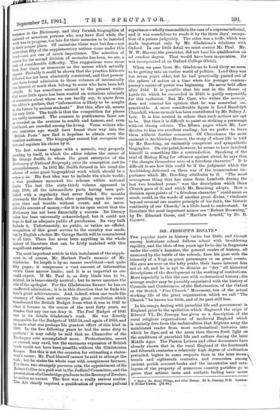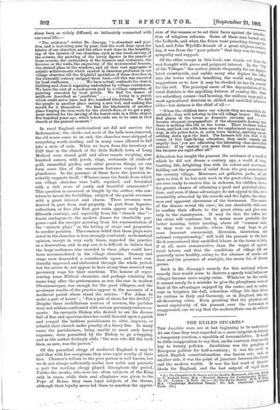DR. JESSOPP'S ESSAYS.* THE popular taste in history varies but
little, and though among historians school follows school with bewildering rapidity, and the idols of ten years ago lie to-day in fragments under the critic's hammer, the general reader of history, all unmoved by the battle of the schools, fixes his gaze with the intensity of a Yogi on great personages or on great events. His eyes are ever on the lofty peaks, their bases interest him not at all, and he is apt to dismiss as " dry " all historical descriptions of the development or the working of institutions,. More especially is this the case with ecclesiastical history; the average reader may be passably acquainted with the history of Councils and Conferences, of the Reformation, of the Oxford or the Scotch " Free Church " Movement, but of the actual working life of the great organisation which we call " The Church " he knows too little, and of its past still less.
In his essays dealing with parochial life and governinent ih England prior to the spoliation which disgraced the reign of Edward VI., Dr. Jessopp has given us a description of the rural religious organisations of .mediteval England which is entirely free from the technicalities that frighten away the uninitiated reader from most ecclesiastical histories into which he dips, and at the same time throws fresh light on the conditions of parochial life and culture during the later Middle Ages. The Paxton Letters and other documents have already shown that in the rural England of the fourteenth and fifteenth centuries a relatively high degree of civilisation prevailed, higher in some respects than in the later seven- teenth and eighteenth centuries, and researches among \ ancient parish account-books and the inventories and cats- logues of the property of numerous country parishes go to prove that artistic taste and seethed° feeling have never
• Before the Great Putage, and other Essays. By A. Jeeeopp, D.D. London: T. Fisher ljawie. Va. Bd.]
since been so widely diffused, so intimately connected with our rural life :— " The evidence," writes Dr. Jessopp, "is abundant and posi- tive, and is increasing year by year, that the work done upon the fabrics of our churches, and the other work done in the beautify- ing of the interior of our churches, such as the wood-carving of the screens, the painting of the lovely figures in the panels of those screens, the embroidery of the banners and vestments, the frescoes on the walls, the engraving of the monumental brasses. the stained glass in the windows, and all that vast aggregate of artistic achievements which existed in immense profusion in our village churches till the frightful spoliation of these churches in the sixteenth century stripped them bare,—all this was executed by local craftsmen We have actual contracts for church building and church repairing undertaken by village contractors. We have the cost of a rood-screen paid to a village carpenter, of painting executed by local artists. We find the names of artificers described as aurifaber living in a parish which could never have had five hundred inhabitants. We find the people in another place casting a new bell, and making the mould for it themselves. We find the blacksmith of another place forging the iron-work for the church-door, or we get a pay- ment entered for the carving of the bench-ends in a little church five hundred years ago, which bench-ends are to be seen in that church at the present moment."
In rural England ecclesiastical art did not survive the Reformation; the clocks and most of the bells were removed, the old music came to an end, the churches were stripped of everything worth stealing, and in many cases allowed to fall into a state of ruin. When we learn from the inventory of 1529 that in the church of the little Suffolk town of Long Melford were stored gold and silver vessels weighing nine hundred ounces, with jewels, rings, vestments of cloth-of- gold, enamelled girdles, and other precious things, we can form some idea of the enormous fortunes reaped by the plunderers. In the presence of these facts the question in- evitably suggests itself, " Whence came the funds from which our village churches were built, repaired, and furnished with a rich store of costly and beautiful ornaments ? "
This question is answered at length by the author, who con- trives to invest the forbidding subject of the parish revenues with a great interest and charm. These revenues were derived in part from real property, in part from legacies, collections, or fees (the first pew rents appear early in the fifteenth century), and especially from the "church ales "- feasts analogous to the modern dinner for charitable pur- poses—and the receipts accruing from the representation of
the " miracle plays " or the letting of stage and properties to needier parishes. The common belief that these plays were acted in the churches is here strongly combated ; ecclesiastical opinion, except in very early times, regarded the practice as a desecration, and in any case it is difficult to believe that
the large audiences who crowded to these plays could have been accommodated in the village churches. Scenery and stage soon demanded a considerable space, and were con- tinually improved and elaborated through the whole period, but the actors do not appear to have at any time received any
pecuniary wage for their exertions. The honour of repre- senting some Biblical character, and perhaps retaining his name long after the performance, as was the case in modern
Oberammergau, was enough for the good villagers, and the grotesque results of the practice appear in the accounts of a mediaeval parish where stand the entries : " For Adam to make a pair of hosen" ; "For a pair of shoes for the devil (!)" Despite these multifarious sources of revenue, the parishes were not seldom confronted with serious pecuniary embarrass- ments. An energetic Bishop who desired to see his diocese full of fine and spacious churches could descend upon a parish and compel the luckless parishioners to alter, improve, or rebuild their church under penalty of a heavy fine. In many cases the parishioners, being unable to meet such heavy expenses, were permitted by the Bishop to go a-begging, and as the author feelingly adds, "the man who did the work then, as now, was the parson."
Of the parochial clergy of mediaeval England it may be said that with few exceptions they were right worthy of their hire. Chaucer's tribute to the poor parson is well known, but we do not always sufficiently realise how noble and patriotic a part the working clergy played throughout the period. Unlike the monks, who were too often subjects of the King only in name, while their real allegiance was given to the Pope of Rome, they were- loyal subjects of the throne, although their loyalty never led them to sanction the oppres-
sion of the masses or to set their faces against the inh.„77--„,, tion of religious reforms. Some of these men burned. .47; the Lollards, and when the friars went Preaching through the land, and John Wycliffe dreamt of a great religions av,ake;
ing, it was from the " poor priests " that they won the d
_ %peat
sympathy and support.
Of the other essays in this book, one stands out from the rest fraught with grave and poignant interest. In the " of the Villages " the author pleads eloquently for our depop11 kited countryside, and unlike many who deplore the 66' into the towns without benefiting the world with practical suggestions as to how it may be checked, he has his remedy for the evil. The principal cause of the depopulation of the rural districts is the appalling dulness of country life; Uwe are subsidiary causes—bad housing, the uniform wage paid is
most agricultural districts to skilled and unskilled labourers alike—but dulness is the chief of all :-
"When the children leave our schools they are unsettled, dis satisfied ; they will not stay in the old village homes. The girls find places in the towns as domestic servants and ... become eloquent propagandists of the abominable doctrine that there is nothing like life in the towns. Their brothers believe them, and look out with keen eyes for employment upon the rail. way, in the police force, in some town factory, anything except settling down upon the land. The farmers tell you that it all comes of this high-flying education, they insist warmly and angrily that ' you are educating the labouring class above their station.' If by station' you mean their present surroundings, the farmers are right after all."
Education has taught the peasant the existence of a world of which he did not dream a century ago, a world of busy, bustling life, delighting him with its colour and movement, holding out the promise of relief from the grey monotony of the country village. Museums, art galleries, parks, all are open to him if he but seek work in the great cities; hospitals are ever ready to receive him in sickness, his children have a far greater chance of obtaining a good and practical edam- tion; and even if these advantages do not appeal to him, he is irresistibly attracted by the crowds and the lights, the sharp- ness and apparent cleverness of the townsman. The causes of the disease reveal the cure ; let our charitable rich cease
to confine their efforts to the great cities, aad give some help to the countryman. It may be that the influx into the cities will continue, but it seems more probable that better housing, better nursing, above all common halls, be they ever so humble, where they may hope to get some innocent amusement, diversion, instruction, and
rational companionship," will hold the peasant to the land. Be it remembered that unskilled labour in the towns is little, if at all, more remunerative than the wages of agricul- tural labour, and that the conditions of village life are generally more healthy, owing to the absence of smoke and dust, and the presence of sunlight, the sworn foe of disease germs.
Such is Dr. Jessopp's remedy for this national evil,--a remedy that would seem to deserve a speedy trial before our villages become mere empty ruins. Whatever be the result, it cannot surely be a mistake to give the ploughman some at least of the advantages enjoyed by the coster, and to endea- vour to brighten the dull, colourless village life that drives its victims in Italy and Germany, as in England, into the all-devouring cities. Even granting that the physical and moral superiority of the peasant over the townsman is exaggerated, can we say that the modern State can do without him ?







































 Previous page
Previous page